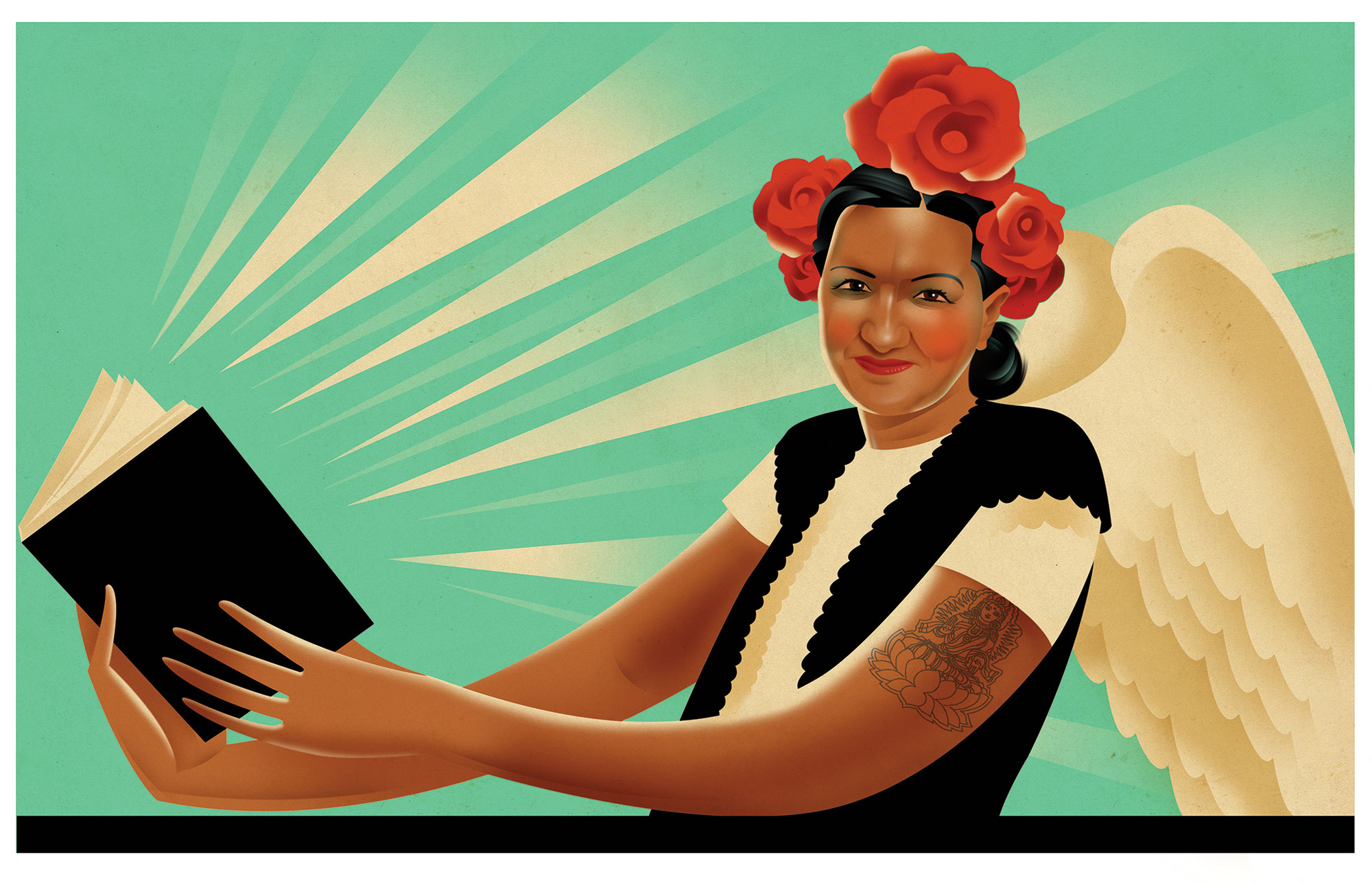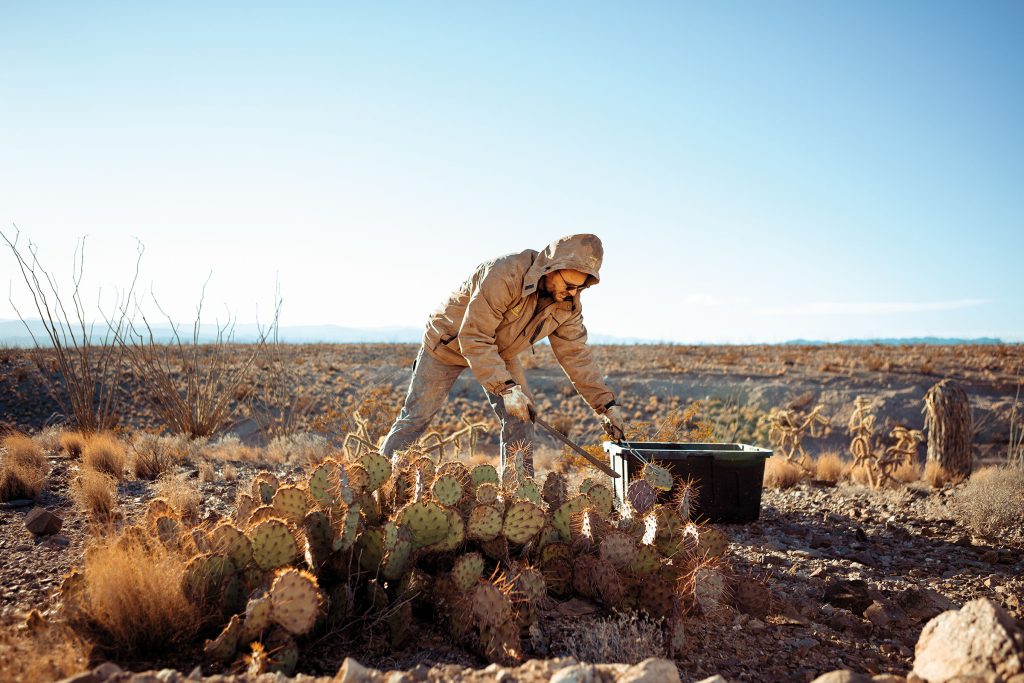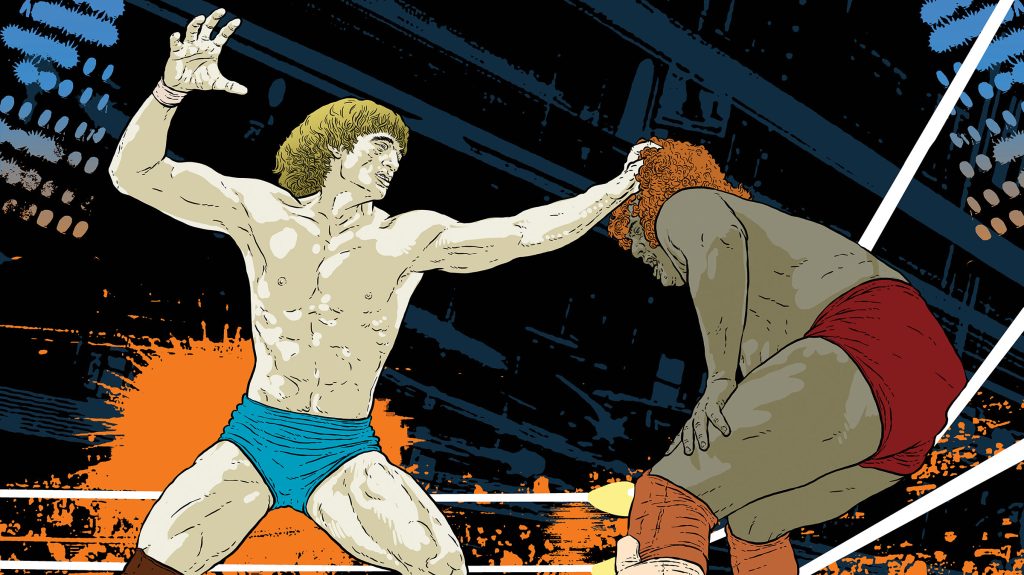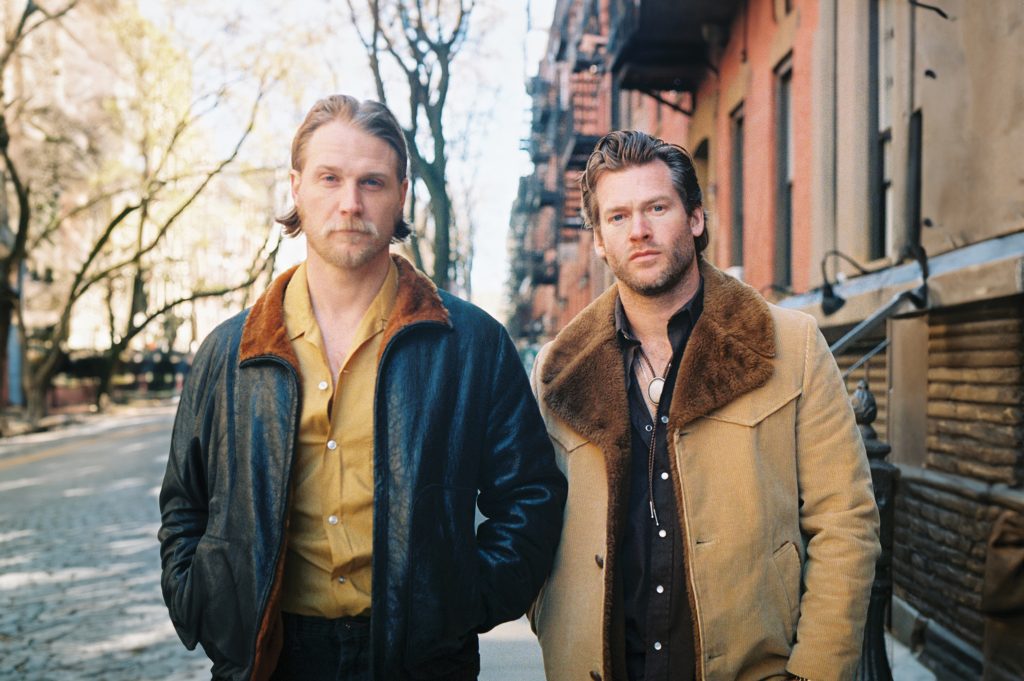
Last spring, the writer Sandra Cisneros returned to San Antonio to meet with her accountant, address some computer issues, and have her mother’s fur hat professionally cleaned. Cisneros has lived in San Miguel de Allende, Mexico, since 2013, but she resided in San Antonio for most of the 29 years prior, living in the King William District, where she stirred controversy for painting her Victorian cottage periwinkle. Her visit coincided with Fiesta San Antonio, and Cisneros appeared on the float “March To Your Own Drummer”—a fitting theme. “I think I can quote Fidel Castro here,” she says. ‘“History will absolve me.’”
“I think everybody, every young person, should be given a grant to travel to a place where you don’t speak the language.”
In 1984, the same year her lauded debut novel The House on Mango Street was published, Cisneros moved from Chicago to San Antonio to serve as literature director at the Guadalupe Cultural Arts Center. She drew on her Texas experiences in her writing and, while in San Antonio, also founded the Macondo Writers Workshop, dedicated to community-building and social change. Cisneros’ works—in 2015, she released a career-spanning essay collection A House of My Own—have earned her high honors, including the MacArthur Fellowship, a Texas Medal of the Arts, and during her spring visit, a Texas Institute of Letters Lifetime Achievement Award.
Q: How are writing and traveling alike?
A: I think that reading is traveling. Reading happened to me because I was trying to get out of Chicago. I was trying to get out of my neighborhood. I was trying to get out of my depression. And reading allowed me to do that. Eventually reading would lead to writing, and writing still allows me to disappear. If I’m somewhere and I want to be invisible, I just pick up my pen and I feel invisible, and I’m transported without having to get in a vehicle. It just takes me to other realities, to other times, to memories, and to the future. So to me, writing and reading are the best ways to travel.
Q: As a young woman, you went to Athens, Greece, to finish writing The House on Mango Street and have since become a world traveler. Why?
A: I was the only daughter in a very conservative, traditional Mexican family. My father was always concerned for my safety. He wanted to protect me. So he made me feel like I was incapable of traveling alone, without a man. I lived in neighborhoods where my brother had to walk me to the bus stop on the corner because it was so dangerous. So, I understand his fear, but as a young woman, I was growing up during the women’s movement, the civil rights movement. I just wanted to be a modern woman, and it seemed like if I followed my father’s traditions I was never going to get there. One of the things I wanted to do with my life was to be able to be fearless, and one of the big fears I had was about traveling. So, I bought myself that one-way ticket to get over the fear.
Q: What are your thoughts about women traveling alone?
A: I think everybody, every young person, should be given a grant to travel to a place where you don’t speak the language. We have to go outside our zones of comfort because it’s when we’re in zones of discomfort that we’re challenged to grow in our lives. It’s like four years of college rolled into a season when you travel because it teaches you to expand your mind. Like Mark Twain said, “Travel is fatal to prejudice, bigotry, and narrow-mindedness.” So I would say it’s very important that all women travel, but we need to train them how to not take risks, not to trust people, and to never be unguarded. I think it’s important that there be seminars about training women and understanding the culture you’re going to because the culture is going to see you in a way you don’t see yourself. And I would always say travel, if you can, with a friend.
Q: Was moving to Mexico, the land of your heritage, an attempt to come full-circle?
A: I think I’m following my mother’s ancestors because my mother’s family is from the region where I live. We never knew much about them because they fled during the Mexican Revolution. And I came back a hundred years later to that region. I’m not in the same town because they were in the countryside near the airport, but I feel very much a spiritual connection with the ancestors. And I do feel, the older I get, I recognize more that connection with the spiritual world and with my own spirituality. So I think I’m being called back. I don’t know why, and I know to accept where my intuition takes me. When I was younger, I had a lot of doubts about my life. But the older you get, the more you start seeing patterns, and you realize that there’s some divine providence that’s leading you.
Q: How does place affect your writing?
A: I’m very much a product of where you put me. When I lived here in this neighborhood [the King William District], South Texas voices creeped into my writing. Woman Hollering Creek was written in this neighborhood, and a lot of my poetry is from this neighborhood. So I’m really a product of what I hear. People’s dialogue and voices and dialects and language and slang come into my writing.
Q: How did your time as a writing fellow at the Dobie Paisano Ranch cultivate you?
A: Big time. It changed my attitude about Texas. After my first year here, I was marching away. I was in hair-on-fire mode in San Antonio—this is the most difficult place I’ve ever lived and I’m never coming back. I was literally wrapping a flower pot in newspaper when I got the phone call. And instead of being thrilled, I remember my dismay. I thought to myself, oh no, I have to stay in Texas. It was scary. I’m from the city. And once I was out there in the country, I thought, this is like a healing sanatorium where the universe sent me. I just kind of remember sitting out there in these Adirondack chairs and looking at this huge sky and thinking, what a beautiful place. So it was very healing. It kept me in Texas. It shifted me and made me realize that Texas is not a bad place.
Q: What are you working on now?
A: I got a Ford Foundation Fellowship last year. I’ve been interviewing people on the issue of the undocumented: people who are hiring the undocumented, people who are Dreamers, people who are undocumented themselves, people who work with them, people who voted for this administration, people who didn’t. So, I’ve been listening. I think it’s essential because we’re living in a time when no one listens, but everyone has an opinion. I’ve got to put them together in a script. Maybe it will become a play, maybe it will become an opera.
Q: Do you consider yourself a free spirit?
A: I think of myself as being a person who lives by her intuition, and I think of myself as a spiritual being. But other people see that as eccentric or free spirited. I think of everyone else as being sheep that don’t listen to their hearts. I’ve always been guided by my heart.








